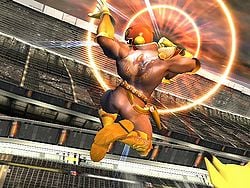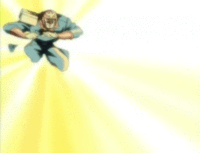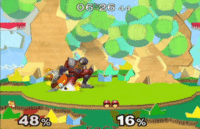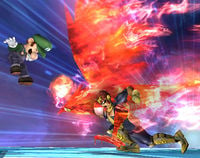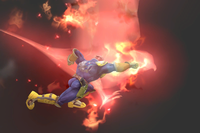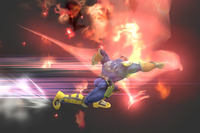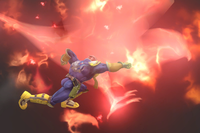Falcon Punch
| Falcon Punch | |
|---|---|
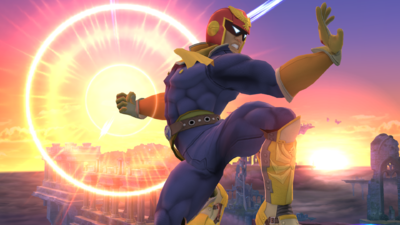 Captain Falcon charges a Falcon Punch in Smash 4 | |
| User | Captain Falcon |
| Universe | Super Smash Bros. F-Zero |
| Article on F-Zero Wiki | Falcon Punch |
| “ | Release a fiery blow after a brief charge. | ” |
| —Melee's instruction manual | ||
| “ | A splendid punch. Punch backward for more power. | ” |
| —Smash for 3DS's foldout | ||
Falcon Punch (ファルコンパンチ, Falcon Punch) is Captain Falcon's neutral special move.
Description
The move consists of Captain Falcon throwing a powerful punch, with his fist engulfed in flames shaped like a falcon. It is one of the most powerful moves in all four Super Smash Bros. games, with the highest knockback of any of Falcon's attacks (including charged smashes). This move is one of the few attacks in the game that is more powerful than the Home-Run Bat at high damages (and since Captain Falcon's home-run attack has an upward trajectory in Melee, it is always more useful), and thus players use it in Captain Falcon's world record Home-Run Contest strategies. However, the Falcon Punch is very slow, with a start-up time of 52 frames in Melee[1]. It is also very noisy, especially since Captain Falcon has to announce it with a "Falcon...PUNCH!" every time he uses it, making it even more predictable.
The move is one of Captain Falcon's primary KO moves in Super Smash Bros. It is best used when timed to match an opponent's recovery, KOing them as they recover.
In Super Smash Bros. Brawl and onward, Captain Falcon can turn around during the start-up of the punch, increasing its damage. This is a Reverse Falcon Punch. The Reverse Falcon Punch does slightly more damage than a standard one, but has slightly more start-up time. Although the move can be reversed in Melee like all neutral special moves, no changes are noticeable bar direction. The move has become quite a meme around the internet, so much that it is even referenced in Snake's codec conversation, and that the crowd cheer for Captain Falcon is "Falcon Punch!" in the English version of Smash Super Bros. 4.
In Super Smash Bros. 4, the Falcon Punch once again returns as Captain Falcon's neutral special. It has increased range, and has two additional customization options: the Dashing Falcon Punch and the Mighty Falcon Punch.
Aesthetically, Captain Falcon kneels downward during the delay before thrusting forward from the said crouching position.
In-Depth
Super Smash Bros. Brawl
Falcon Punch has three different hitboxes, dependent on distance. When it is reversed, all hitboxes deal 1% more damage and slightly higher knockback, and when it is used in the air, all hitboxes deal 1% less damage. Reverse aerial Falcon Punches have no change in damage but still deal slightly higher knockback.
| Type | Damage |
|---|---|
| Falcon Punch (close) | 27%, most knockback |
| Falcon Punch (far) | 24%, least knockback |
| Falcon Punch (very close) | 25%, medium knockback |
Super Smash Bros. 4
The Falcon Punch now makes Captain Falcon slide forward when used. It deals 25% damage along all of its hitboxes. When reversed, it deals 28% damage and higher knockback. When used in the air, the Falcon Punch deals 3% less damage. If it is charged in the air and activates on the ground, this penalty does not apply.
The Falcon Dash Punch is one of Captain Falcon's custom special moves. It deals 20% damage, 22% reversed. If used in the air, it deals 17% damage, 20% reversed. When the Falcon Dash Punch is used, Captain Falcon slides forward much more than a normal Falcon Punch. This attack deals the most knockback near the beginning of the dash, decaying as the dash goes on. Even at the beginning of the dash, this attack's knockback is much weaker than that of a normal Falcon Punch. In all other respects, this attack is the same as a regular Falcon Punch.
Origin
The move originated in the Super Smash Bros. series and is generally considered part of the Super Smash Bros. universe, as well as simply being part of his falcon motif. However, after Melee's release, Captain Falcon famously performed a Falcon Punch in the F-Zero animated series, F-Zero: GP Legend, where he uses it to defeat Black Shadow (see video). It has become quite memetic, as the clip makes it appear that the Falcon Punch causes an explosion that can be seen from outside the Milky Way Galaxy, when in reality, Captain Falcon is merely using the Falcon Punch to prevent Black Shadow from escaping said explosion. The meme also involves Falcon Punch imitations of some sort, with voice clips inserted (though special effects are not necessary). This is reinforced in a Subspace Emissary cutscene, when Captain Falcon performs a Falcon Punch on a giant R.O.B. in a very similar fashion to the clip from the animated series. The meme has crossed all the way back to Super Smash Bros. and is referenced in Captain Falcon's codec with Snake (Otacon in this case, coincidentally sharing the same Japanese voice actor that voiced Falcon in the said animated series).
As a testament to the move's popularity, it seems to have come full circle and crossed back over into F-Zero canon: it is mentioned in F-Zero GX's ending song, specifically in the line "When my open confusion threatens your lunch / Falcon will be unleashing a Falcon Punch."
Appearances
In Super Smash Bros.
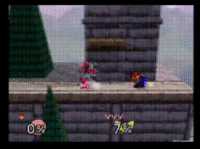
The Falcon Punch in Super Smash Bros. is easier to combo with than in every other game due to it having only SDI and much less start-up and ending lag than in the subsequent games (as well as the lack of air dodging at the time). It is generally used as a combo finisher; common tactics include forward throw → Falcon Punch (48-72% on Fast Fallers using various jump heights) and up aerial → Falcon Punch. Down aerial to Falcon Punch also works at specific percents; this combo is named the Tapion Combo after a Smasher that landed it consistently. Falcon Punch can also be used for recovery when Falcon is recovering high, as it gives additional horizontal distance as well as minor vertical distance when angled up.
In that game, Captain Falcon brings up his fist above and behind as it rapidly shakes while crouching away from his opponent awkwardly; while in midair, he cowers away from his orientation instead. Visible shockwaves can be seen as a visual effect while charging.
In Super Smash Bros. Melee
In Melee, the Falcon Punch was made much slower, which removes its use as a recovery and combo-finishing option, though the punch itself is stronger and now has a full 3D model, complete with more realistic fire effects. Due to Captain Falcon's down aerial being much slower than in SSB64 and the lowered effectiveness of L-canceling and the introduction of DI, the Tapion Combo was made more unreliable and very uncommon in competitive play.
One of the most famous combos is the Sacred Combo. Originating in Melee, it is a combo that uses Captain Falcon's forward aerial (the Knee Smash) and the Falcon Punch. The combo itself is performed by knocking an opponent off the stage with Captain Falcon's forward aerial and then jumping off the edge of the stage before striking the opponent with an aerial Falcon Punch. If performed successfully, this combo results in a KO in almost all cases, although by performing this combo, Captain Falcon may fail to recover back to the stage in Melee if he jumps too far off the edge to perform his Falcon Punch. In either case, KOing an opponent with the Sacred Combo is widely regarded as being one of the most satisfying ways to do so.
Another combo is the G-Regulate combo. Named after G-regulate, it allows Captain Falcon to combo an L-canceled down aerial into a Falcon Punch against some characters at some damages. It can be avoided with DI.
Here, the animation is notably changed. Captain Falcon brings back his fist lower in a more straightened crouching stance with his left hand held in front of him. In midair, aside from his leg positioning, the animation is the same as done on ground; he'll also do a recovering inward turn after the punch. The original shockwave effects from the prior version of the attack are omitted.
In Super Smash Bros. Brawl
In Brawl, the Falcon Punch was both buffed and nerfed, but was improved overall. Despite being faster, the punch retains its slow startup from Melee, while also being weaker. However due to the introduction of the Reverse Falcon Punch, which gets stronger and turns Captain Falcon around at the cost of startup, he gains a new variety of tricks with it. The attack also sports new effects and improved animation. For example, Captain Falcon puts forward his right fist more before the attack and slightly leans forward just before the hitbox of the move comes out out of exaggeration.
In Super Smash Bros. 4
The Falcon Punch was nerfed from Brawl with little compensation, being weaker and having more ending lag (the new base knockback and ending lag make it unsafe on hit at 0%), while still having slow startup. Falcon Punch sees a little bit more utility due to air dodges having landing lag like in Melee, but otherwise the same tactics from Brawl apply. The animation is also the exact same as in Brawl, though the original falcon cry is replaced upon the frame the falcon fire image comes out.
Customization
Special Move customization was added in Super Smash Bros. 4. These are the variations:
| 1. Falcon Punch | 2. Falcon Dash Punch | 3. Mighty Falcon Punch |
|---|---|---|
| "Charge up for a moment, then strike. The direction can be changed while charging." | "Dash forward and punch. Slightly weaker, and you're vulnerable before striking." | "A bigger, more powerful Falcon Punch, but the buildup leaves you more open than ever." |
- Falcon Punch: Default.
- Falcon Dash Punch: After startup, Falcon dashes forward, dealing less damage than default.
- Mighty Falcon Punch: Has a bigger hitbox, but has even longer startup. Contrary to its name and description, its damage and knockback are actually weaker than the default.
Gallery
- Falcon Punch SSBM.jpg
Falcon Punch in Melee.
Kirby copying Falcon Punch in Brawl, and the difference between the two punches.
Pre-release image of Falcon Punch in Super Smash Bros. for Wii U.
A full view of the fiery falcon in Super Smash Bros. for Wii U.
Trivia
- There is a glitch in which if a player uses a Reverse Falcon Punch on Pit, and Pit pulls out the Mirror Shield at the correct moment, Captain Falcon will be sent backwards a long way, longer than many stages (but not all of them, so he won't necessarily get KO'd). An example can be seen here. The same can be done with Mario's Cape and Ganondorf's Warlock Punch.
- If Kirby uses the Falcon Punch immediately after a jump, he will get a large boost upward. This is most noticeable with his footstool jump, which goes nearly twice as high as normal. This is sometimes known as a footstool punch.
- In Melee and Brawl, if a Falcon Punch is performed, the echoing sound of a falcon screeching can be heard.
- This no longer happens in Super Smash Bros. 4; instead the Falcon Punch uses a "BOOM" sound.
- In Brawl, the falcon-shaped flames appear after the first hitbox, whereas in SSB64 and Melee they appear at the same time.
- In Lucina's and Robin's reveal trailer, Captain Falcon uses Falcon Punch with his left fist, as opposed to his right in-game.
- As a side note, due to Kirby always facing the screen in Super Smash Bros. 4, he will either use his left or right fist to perform Falcon Punch, depending on which way he is facing.
See also
External links
The following are five videos showing the Sacred Combo being performed:
- The Sacred Combo performed in Super Smash Bros. Melee.
- Mew2King performs the Sacred Combo in Super Smash Bros. Melee
- The Sacred Combo performed in Super Smash Bros. Brawl.
- The 180-degree (180°) turn Sacred Combo performed in Super Smash Bros. Brawl, with a 180° turn (using a Reverse Falcon Punch).
- The Sacred Combo being performed in Super Smash Bros. for Nintendo 3DS
- The Sacred Combo being performed in Super Smash Bros. for Nintendo 3DS
- The Sacred Combo being performed in Super Smash Bros. for Wii U
References
- ^ http://www.angelfire.com/games5/superdoodleman/Captain_Falcon_frames_11.6.05.txt SuperDoodleMan's frame data
